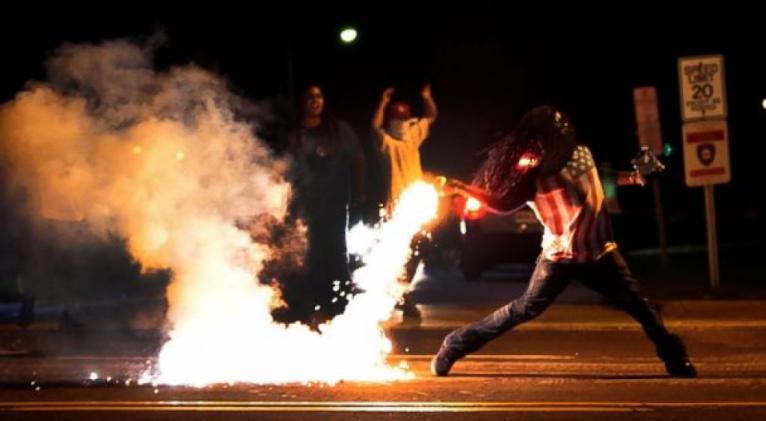The Fight for Dignity Ferguson and the Right of Resistance
especiales

Barack Obama, the obsequious errand boy for the financial and corporate plutocrats who own the U.S. government, made a pathetic appearance on national television to try to persuade the “natives” to remain peaceful in response to the non-indictment of the Ferguson killer-cop. His inane comments extolling the value of non-violence and the rule of law seemed strangely incongruent with the militaristic rhetoric and policies of his administration over the last few years.
Yet, Obama’s positions on law and violence are not as contradictory as they might appear when these positions are resituated within the context of imperial logic and the framework of power. Legitimate violence is always determined by history’s dominant powers and employed as a weapon to maintain and extend that dominance. Over the last five hundred years Europe emerged from the backwaters of history and cultural backwardness to predominance as a result of genocide and land theft in the Americas, the trans-Atlantic slave trade, and colonial/capitalist development. The violent establishment of capitalism, racism, and heteropatriarchy enabled the West to impose its definitions of legitimacy, including “legitimate” violence.
Thus when Palestinians resist the theft of the their land and the killing of their people by Israeli colonists, their response is defined as illegitimate violence that sparks support for Israel’s “right to defend itself.” When Africans waged national liberation struggles to free themselves from European colonial domination in places like Kenya, Angola, Mozambique, Zimbabwe and South Africa, the West condemned their efforts as illegitimate. Furthermore, because those struggles were determined to be illegitimate colonial powers felt justified to viciously attack those efforts with the support of the U.S. government. And when African Americans organized against police violence and for self-determination and our own definitions of liberation in the 60s, our efforts were deemed illegitimate. We were brutally suppressed with the full range of state terror tactics including beatings,
deaths, infiltration, surveillance, and the jailing of activists for decades.
Therefore, we should understand the State’s response to our discontent in the aftermath of the murder of Michael Brown in this context. The heavy-handed use of violence to deny the people the human rights to peacefully assemble and freedom of association is consistent with the historical uses of violence to control and suppress opposition. And the state’s determination that more militant forms of popular resistance are illegitimate helped to shift the attention of the capitalist media to black resistance and away from the issue of impunity for yet another law enforcement official who literally gets away with murder.
The focus on the forms of resistance taking place in Ferguson is reflective of a shared, cross-class and racialized world-view that accepts the carefully constructed elite view concerning what constitutes illegitimate resistance. This hegemonic view creates a moral myopia that makes it impossible for many in white America to understand the point of view of the resisters to this non-indictment. This ideological and even cognitive disconnect makes the call for more national conversations on race such a dangerous diversion from the more immediate historic task at hand.
The task of the African American resistance movement is not to worry about sitting down with white people infected with the disease of white supremacy, but to build the capacity of black poor and working class folks to resist the intensifying expressions of repressive state power directed at our people. From that base, we can and should talk about building coalitions with other oppressed communities and people who are ready to take on the task of opposing the settler capitalist state at every level.
So while the corporate media has been somewhat successful in shifting the focus from the injustice of the non-indictment to the reaction of protestors, the insights provided by brother Malcolm X offer a framework for understanding what must be done.
For Malcolm, resistance is not a crime. In fact, the fight for human dignity and human rights is what makes us human. But he argued that there is a price that people must be prepared to pay. According to Malcolm:
“…you shouldn’t even be allowed around us other humans if you don’t want to pay the price. You should be kept in the cotton patch where you’re not a human being. You’re an animal that belongs in the cotton patch like a horse or a cow, or a chicken or a possum, if you’re not ready to pay the price necessary to be paid for recognition and respect as a human being.”
And what was the price? “The price is death really. The price to make others respect your human rights is death. You have to be ready to die…” “This is all we want—to be a human being.”
In our quest for authentic freedom for ourselves and our children who are being spiritually and literally murdered, Malcolm is reminding us that we have to be prepared to make the ultimate sacrifice. This willingness to sacrifice, as inchoate and thinly grounded as the mass resistance was in Ferguson, demonstrated, nevertheless, that many of our young people are still prepared to pay the price for freedom. We should be proud that the spirit of struggle, resistance, and sacrifice is still alive. The experience of Ferguson demonstrated to people around the world that despite the opiate of credit-based false prosperity, illusions of system inclusion and Barack Obama – African Americans are finally awakening from an almost two decade long sleep and in the process reawakening the spirit of resistance for everyone.













Add new comment